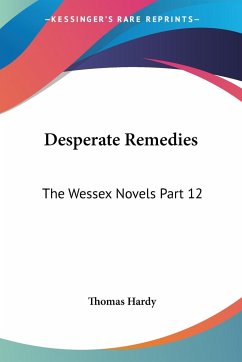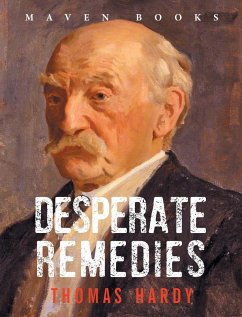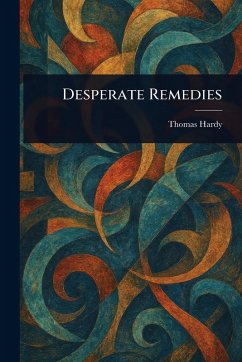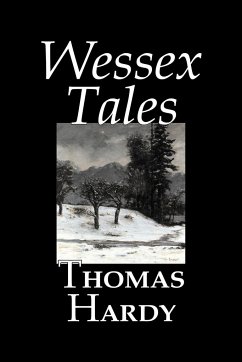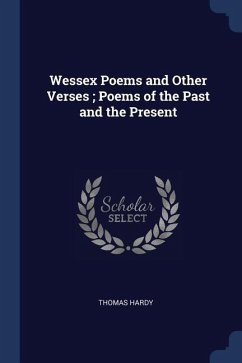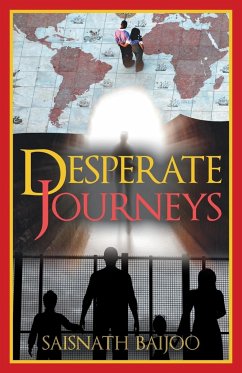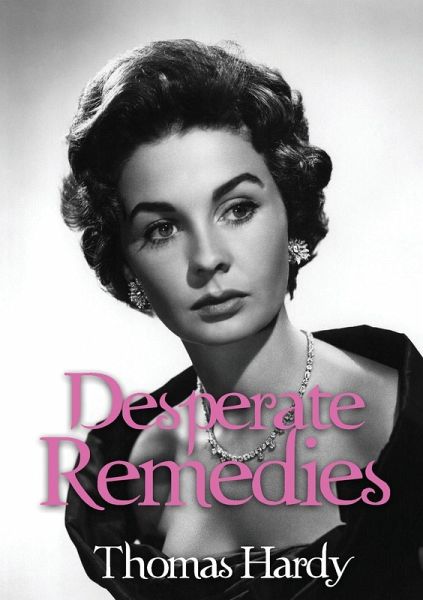
Desperate Remedies
a novel by Thomas Hardy
Versandkostenfrei!
Versandfertig in 1-2 Wochen
17,99 €
inkl. MwSt.

PAYBACK Punkte
9 °P sammeln!
DESPERATE REMEDIES IS THE SECOND NOVEL BY THOMAS HARDY, ALBEIT THE FIRST TO BE PUBLISHED. IT WAS RELEASED ANONYMOUSLY BY TINSLEY BROTHERS IN 1871. Plot : Cytherea has taken a position as lady's maid to the eccentric arch-intriguer Miss Aldclyffe. On discovering that the man she loves, Edward Springrove, is already engaged to his cousin, Cytherea comes under the influence of Miss Aldclyffe's fascinating, manipulative steward Manston.Analysis : In Desperate Remedies a young woman, Cytherea Graye, is forced by poverty to accept a post as lady's maid to the eccentric Miss Aldclyffe, the woman whom...
DESPERATE REMEDIES IS THE SECOND NOVEL BY THOMAS HARDY, ALBEIT THE FIRST TO BE PUBLISHED. IT WAS RELEASED ANONYMOUSLY BY TINSLEY BROTHERS IN 1871. Plot : Cytherea has taken a position as lady's maid to the eccentric arch-intriguer Miss Aldclyffe. On discovering that the man she loves, Edward Springrove, is already engaged to his cousin, Cytherea comes under the influence of Miss Aldclyffe's fascinating, manipulative steward Manston.Analysis : In Desperate Remedies a young woman, Cytherea Graye, is forced by poverty to accept a post as lady's maid to the eccentric Miss Aldclyffe, the woman whom her father had loved but had been unable to marry. Cytherea loves a young architect, Edward Springrove, but Miss Adclyffe's machinations, the discovery that Edward is already engaged to a woman whom he does not love, and the urgent need to support a sick brother drive Cytherea to accept the hand of Aeneas Manston, Miss Adclyffe's illegitimate son, whose first wife is believed to have perished in a fire however, their marriage is almost immediately nullified when it emerges that his first wife had left the inn before it caught fire. Manston's wife, apparently, returns to live with him, but Cytherea, her brother, the local rector, and Edward come to suspect that the woman claiming to be Mrs. Manston is an impostor. It emerges that Manston killed his wife in an argument after she left the inn, and had brought in the impostor to prevent his being prosecuted for murder, as the argument had been heard (but not seen) by a poacher, who suspected Manston of murder and had planned to go to the police if his wife did not turn up alive. In the novel's climax, Manston attempts to kidnap Cytherea and flee, but is stopped by Edward he later commits suicide in his cell, and Cytherea and Edward marry.Reviews : Blackmail, murder and romance are among the ingredients of Hardy's first published novel, and in it he draws blithely on the 'sensation novel' perfected by Wilkie Collins. Several perceptive critics praised the author as a novelist with a future when Desperate Remedies appeared anonymously in 1871. In its depiction of country life and insight into psychology and sexuality it already bears the unmistakable imprint of Hardy's genius. (Goodreads)About the author : Thomas Hardy, OM, was an English author of the naturalist movement, although in several poems he displays elements of the previous romantic and enlightenment periods of literature, such as his fascination with the supernatural. He regarded himself primarily as a poet and composed novels mainly for financial gain. The bulk of his work, set mainly in the semi-fictional land of Wessex, delineates characters struggling against their passions and circumstances. Hardy's poetry, first published in his 50s, has come to be as well regarded as his novels, especially after The Movement of the 1950s and 1960s. The term cliffhanger is considered to have originated with Thomas Hardy's serial novel A Pair of Blue Eyes in 1873. In the novel, Hardy chose to leave one of his protagonists, Knight, literally hanging off a cliff staring into the stony eyes of a trilobite embedded in the rock that has been dead for millions of years. This became the archetypal - and literal - cliff-hanger of Victorian prose.Quotes :"Though it may be right to care more for the benefit of the many than for the indulgence of your own single self, when you consider that the many, and duty to them, only exist to you through your own existence, what can be said?""Ideal conception, necessitated by ignorance of the person so imagined, often results in an incipient love, which otherwise would never have existed."¿ Thomas Hardy



